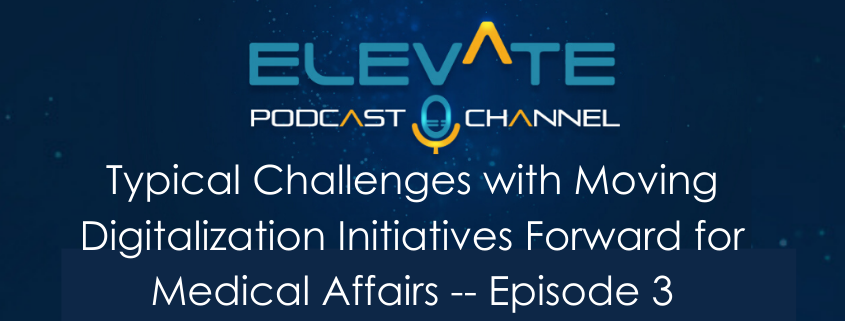The podcast objectives are to:
- Discuss some of the common challenges Medical Affairs organizations face in offering best-in-class digital capabilities to its customers.
- Offer some insights and perspectives both internally and externally to understand what opportunities exist to overcome these challenges.

MODERATOR: Rishi Ohri, MBA, MS

INTERVIEWEE: Ethan Dabbs
Following is an automated transcription provided by otter.ai. Please excuse inaccuracies.
Rishi Ohri 00:00
Welcome to the Medical Affairs Professional Society’s Digital Focus Area Working Group’s podcast three-part series entitled “Typical Challenges with Moving Digitalization Initiatives Forward for Medical Affairs.” My name is Rishi Ori and I’ll be the moderator for this podcast. I serve as a member of the digital focus area Working Group. I’ve been with Astellas Pharma for the past 13 years and have been specializing and heading digital excellence within Medical Affairs for over six years. Our legal disclaimer states, “The views expressed in this recording are those of the individuals and do not necessarily reflect on the opinions of the MAPS, or the companies with which we’re affiliated with. This presentation is for informational purposes only and is not intended as legal or regulatory advice.” We encourage you to engage in conversations about typical challenges with moving digitalization initiatives forward for Medical Affairs with other MAPS members of via the community portal on the MAPS website. Simply login with the email address and password associated with your MAPS account and click on the discussion tab. Then scroll down to digital strategy to post a question or review previous postings. The podcast objectives today are to discuss some of the common challenges Medical Affairs organizations face in offering best in class digital capabilities for its customers to offer some insights and perspectives both internally and externally to understand what opportunities exist to overcome these challenges. In today’s final part three of three series, we will be discussing some key themes as it relates to external trends, opportunities and predictions. For today’s conversations, I’m joined by Ethan Dabbs, managing director and senior partner at Boston Consulting Group. Ethan has over 20 years of experience in the management consulting and digital marketing agency sectors and has been with BCG for 15 years. He specializes in biopharma strategy and commercialization and has worked with many top global pharma companies and biotech companies. He also co-chairs BCG’s Medical Affairs Roundtable, a working group of senior Medical Affairs executives from 25 companies.
Ethan Dabbs 02:24
Thank you so much, Rishi, it’s, it’s really my pleasure to be here.
Rishi Ohri 02:28
Thanks, Ethan. And really, just to kind of get things started out, I did ask in the previous podcast to both Robert and Jonathan, similar questions. So, what’s really interesting to me is to understand your insights from an external perspective. And really what I’m trying to get at is, digital health could mean a lot of different things to a lot of different people, and it’s really a movement that’s generating a fundamental shift in our industry. Now, from your external perspective, Ethan, how do you define digital? And what do you see as the biggest challenge and also the opportunities in promoting digital capabilities within Medical Affairs from your experience?
Ethan Dabbs 03:12
Sure, so maybe first to address how I would define digital, as you said, it can really mean many different things to many different people, I think it can refer to first a way of engaging remotely or virtually, as many of us have been doing for the last year via zoom or other technology platforms. And I think that’s, it can happen in a couple of different ways. So, companies to HCPs, or investigators, HCPs to HCPs, or peer to peer type interactions. And also, HCPs to patients increasingly through the telemedicine applications that, many of us have been either involved in or experiencing increasingly over the last year. So, I think you can also refer to the content that is delivered and accessed online, or, through on demand or self-service modes. I think this is increasingly how medical information is made available and shared by pharmaceutical companies, and it’s also how, it’s accessed by their customers, or their investigator partners. I think, maybe more broadly, I think it can also refer to digital therapeutics, which is a product offering that many biopharma companies are beginning to develop, that they’re conducting investigational trials on and several have also found ways to commercialize. So digital therapeutics I would define as digital companions or in some cases, even alternatives to conventional medicines that, once they’re studied in clinical trials and approved by regulators can be prescribed as a way to improve or enhance the outcomes of traditional therapies. And digital therapeutics applications and tools can really also enhance the communications and flow of information about symptoms or changes in a patient’s condition. And that information flowing between patients, and they’re their providers between physical appointments. And I think you can also improve medication adherence. We’re certainly seeing evidence of that in some of the digital therapeutics applications. So I think this is increasingly relevant for Medical Affairs teams, as they’re often involved in the product and trial design of digital therapeutics, the recruitment of study sites and investigators, and also the analysis and interpretation of the data that emerged from digital therapeutics trials and the commercial products. And maybe answer your question about challenges and opportunities. You know, I would say that these are all related, both the challenges and the opportunities. So much is changing so quickly in the digital space, that I think it can be really challenging for companies and even Medical Affairs professionals they’re in to really keep their knowledge current. But at the same time, it can be a great opportunity and even a competitive differentiator or advantage for those who do. And I think we’ve seen that as part of some of our roundtable discussions is the companies that are really beginning to succeed, and the individuals their end that are beginning to succeed, really, really are focused on digital.
Rishi Ohri 06:39
Yeah, so it’s so relative, Ethan and I often describe my role to others as an art and a science, because it’s changing all the time. And it’s so it’s so interesting, and it keeps me very excited and motivated. But thanks for your comments on that. And for all the folks listening, I did forget to mention that I had the pleasure of collaborating with Ethan, as well as several other industry peers back in 2019, to discuss typical challenges with moving digitalization and initiatives forward, which is our topic today for this podcast as part of a BCG roundtable events. And we spoke about challenges such as the lack of digital strategy, scaling up and rolling out of solutions, which often brings in what we call pilotitis. Also regulatory roadblocks data governance challenges, financial and talent acquisition challenges as well. So even since our last discussion back at the roundtable, can you share a more current perspective of these challenges? And are they the same? Are they different? Are there new ones? from your experience that you’ve noticed.
Ethan Dabbs 07:49
Yeah, we’re all aware a lot has changed since our roundtable in late 2019, and, you know, in the world more broadly. And, I think some of the challenges that, more specifically to digital in Medical Affairs, haven’t really changed or maybe haven’t even really been resolved. But I think the speed with which we’re all adapting to working in a virtual environment, as has helped accelerate, I think the way many companies are thinking about their, their offerings and their capabilities in the in the areas of digital. You know, I’ve had the privilege of collaborating with a client to launch an oncology product, actually a couple of oncology products, in what turned out to be a nearly fully virtual model, including your most of the Medical Affairs and even commercial activities. And, even though we’re typically thinking ahead to the future, at our Roundtable, I don’t think any of us back in November of 2019, could have imagined this level of disruption. Or, on the positive side, the level of success that some of these medical and commercial collaborations could achieve to really help bring life-saving medications to oncology patients during the midst of a global pandemic. You know, but I think there’s really some new challenges to consider including, how to think about the new post COVID equilibrium in the balance of virtual versus in person interactions. And also like the mix of medical versus, more traditional commercial capabilities. I think we’ve learned a lot over the last year, and, we’ve adapted the, the offers to a lot of new HCP customer needs. And I think, many professionals both on the on the medical and commercial side have walked through how to overcome access barriers. But I think it remains to be seen how much of these new ways of working will persist versus how much will revert to the sort of pre pandemic model of customer engagement. I think there’s a lot of people, a lot of our clients, and certainly, the work that we’re doing with many of them, as well as some of our own independent research to watch that dynamic incredibly closely, because it’s going to have significant implications on budgets on organizational size and structure, on capabilities and talent management, and, specifically things like recruiting and retention, training and development. So, lots of lots of changes, but certainly lots of opportunity going forward to.
Rishi Ohri
Definitely Ethan. So, now that we’ve removed review some of these primary challenges, and also some, you know, question that comes to mind are, what are some of the opportunities for medical fears to overcome. You know, the mass community, we all may be at different stages in our evolution of digital, keeping this in mind, I was curious for you to help me understand, you know, one or two recommendations or takeaways that you might share for folks in their digital journeys.
Ethan Dabbs
Sure, you know, and I think I would put this in terms of, opportunities for both the Medical Affairs function as well as Medical Affairs professionals. You know, I think we’re seeing from our research and our work with clients that HCPs and investigators have an increasing appetite for the type of data and information that is, I think we would all argue best and most compliantly delivered in in a physical or virtual two way discussion with a Medical Affairs professional. So, I see clients, also in that vein, really taking a different perspective on how they recruit and deploy their MSLs. I think it used to be, and maybe in some cases still is, but increasingly, this is becoming something of a topic of debate. It used to be that, that companies followed a pretty strict territory-based alignment approach, much like on the on the commercial side of the organization, where you have representatives the line to very specific geographies and territories. But, I think, looking ahead in terms of opportunities, and assuming that one, virtual interactions persist; two, that the appetite of HCPs for medically oriented information also persist. And three, that medically oriented representatives continue to have some sort of advantage in gaining access to HCPs, at least virtually. I think they need to have MSLs, very rigidly or strictly aligned to a territory becomes much less important. And so with the with the increased demand for MSL type skills, especially those with, you know, experience in digital ways of interacting and with various, digital platforms and technologies, that’s really where, I think I see the opportunity, and we’re seeing the opportunity for our clients.
Rishi Ohri 13:22
Now that that makes a lot of sense, Ethan. And I think maybe another topic for another podcast may be around this concept of digital fatigue I keep hearing about, and how to overcome that that challenge as well. But you know, I know I spend a lot of time and my personal time researching new trends, digital disruption, how do we do more with less? And so just curious for you, Ethan, looking at this from an external perspective, if there was a magical crystal ball to help others in planning for their future digital plans, what would you expect? What are you seeing from a trending perspective? I am really interested in your thoughts here?
Ethan Dabbs 14:08
Yeah, if we take out the crystal ball, and maybe really look very far ahead, I think one of the biggest disruptions to watch for over the next decade or so relates to quantum computing, or the use of elements of quantum mechanics to perform operations and analysis on data. I think that will help us solve highly complex analytical challenges much, much faster and more efficiently than we’ve done before. And if you think about implications of that, I think it’s going to have major implications for medicine and the methods by which we discover evaluate, regulate new therapeutic interventions and you know, particularly the speed with which we were able to achieve that. But I mean, that’s really looking to the I think the ladder. part of the decade. If we want to look in the nearer term and maybe in a more practical sense, for some of the folks that are listening to this and what they’re doing within their organizations, I would really expect that digital therapeutics becomes a much more prominent feature of what we all do over the next several years. You know, given there’s a clinical trial component, there’s product design components, there’s an evolving regulatory landscape, there’s been the demonstrated commitment of several biopharma companies, technology players, leading medical centers and health systems to building out digital therapeutics capabilities. And with that also goes the internal capabilities and ways of working required to develop and bring digital therapeutics to market. And I would expect that to be a major area of opportunity for Medical Affairs professionals who want to be part of, innovation in the in the digitally oriented biopharma industry.
Rishi Ohri 16:08
That’s fantastic. And it’s so insightful, Ethan and a huge thank you to you. In the objectives of this podcast really were to discuss some of the common challenges that Medical Affairs organizations face in offering best in class digital capabilities to its customers, and to offer some insights and perspectives both internally and externally, to understand what opportunities do exist to overcome these challenges. This has been the third and final podcast in a series on typical challenges with moving digitalization initiatives forward for Medical Affairs. The first two podcasts were brought more from an internal MA industry perspective within pharma. However, this podcast, we heard a more external perspective. Digital offers an amazing opportunity. I’m sure everyone would agree. I hope this series was insightful and supportive in your own personal journey of implementing digital within Medical Affairs. If you’re a MAPS member, thank you for your continued support of MAPS. And if not, and you’d like to access this material, you may find them actually on the MAPS websites and also consider joining MAPS at the www.MedicalAffairs.org/membership. This concludes this podcast.






